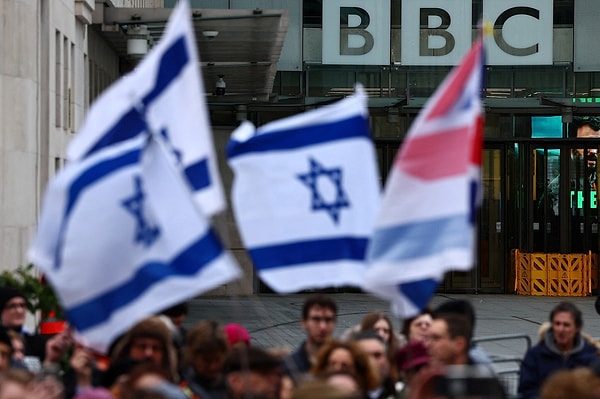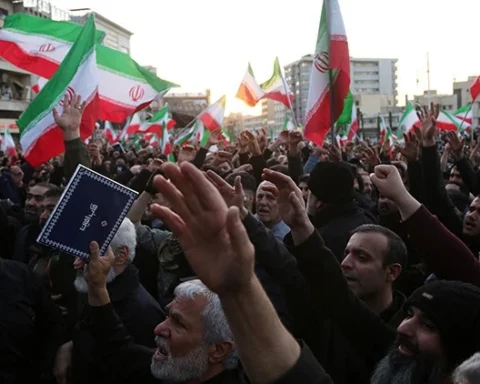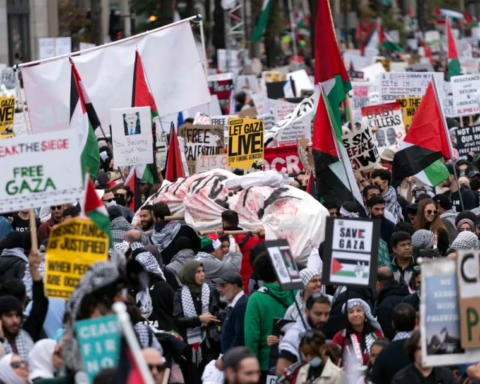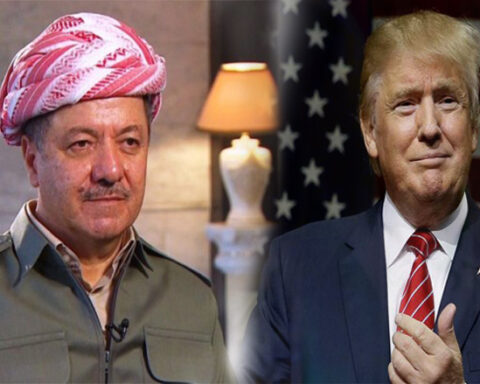A damning report has now confirmed what many of us already knew: that the BBC’s reporting of Israel’s war on Gaza is far from impartial.
The Centre for Media Monitoring (CfMM) analysed the BBC’s coverage of the 12 months following Hamas’ one-day attack on 7 October 2023. Their huge report reveals a clear dynamic: “the marginalisation of Palestinian suffering and the amplification of Israeli narratives.”
The report showed that, despite the killing of 34 times more Palestinians, the BBC gave Israeli deaths 33 times more coverage, interviewed more than twice as many Israelis as Palestinians (1,085 v 2,350), and shared the Israeli perspective 11 times more frequently than the Palestinian one (2,340 v 217).
Complicit in genocide
The report, which examined over 35,000 pieces of content produced by “the world’s most trusted broadcaster,” is full of similarly shocking evidence. But perhaps the most deplorable is the BBC’s failure to report confessions of genocidal intent by Israel’s leaders. Not a single BBC article reported Israel’s prime minister Netanyahu’s biblical “Amalek” reference – a people the Jews were commanded by God to annihilate – or president Herzog’s claim of Palestinian collective responsibility. Just 12 out of 3,873 articles bothered to mention former defence minister Gallant’s statement in which he referred to Palestinians as “human animals”, ordered “a complete siege on the Gaza strip”, and promised “we will eliminate everything”. Genocidal intent is notoriously difficult to prove when classifying an act as genocide, yet here are Israel’s own leaders, readily admitting their intention to wipe out an entire people.
Peter Oborne, one of several journalists to question the BBC about the findings in the report during a parliamentary meeting, said: “You never educated your audience about the genocidal remarks, and according to this report, on one hundred occasions, one hundred occasions, you’ve closed down the references to genocide by your guests. This makes you complicit.”
Lack of crucial context
Oborne’s brilliant tirade, which can be viewed here, also flagged the BBC’s failure to report on two Israeli military doctrines – the Hannibal directive and the Dayiha doctrine – which provide essential context to understanding Israel’s response to the 7 October attacks.
The Hannibal directive allows the Israeli military to use any force necessary to prevent its soldiers from being captured and taken into enemy territory – even if that means opening fire on those captives. A major investigation by Israeli newspaper Haaretz revealed that the procedure was activated during the 7 October attacks, and a UN report concluded that at least 14 Israeli civilians were deliberately killed by their own army on that day as a result of the directive. But as Israel refused to cooperate with the UN investigation – and barred medical professionals and others from doing so – we do not know the true figure. A year-long investigation by Electronic Intifada, however, found it to be in the hundreds.
The BBC has also never mentioned Israel’s Dahiya doctrine. Named after a Beirut suburb that was decimated by Israel in 2006, the Dahiya doctrine is the use of disproportionate force to destroy civilians and everything that supports them so that they will never again contemplate resistance. It is a form of collective punishment – and unquestionably a war crime – that has been applied to Gaza over the past 20 months. The BBC’s decision not to ever mention this doctrine is, as Oborne calls it, “a grotesque omission”, for it provides fundamental context to Israel’s devastating assault on Gaza following 7 October.
No desire to change
You only have to look at the representative the BBC chose to respond to the accusations in the report and defend its Gaza coverage to see how little it cares – and how unlikely it is to change. Richard Burgess, executive news editor at the BBC, admitted he’s “not a Middle East expert” and doesn’t claim to understand the doctrines. A rightly exasperated Oborne responded, “Then send someone along who does!” When a senior news editor is asked to justify their organisation’s coverage of what is widely considered a genocide, ignorance of the full facts is truly an appalling defense.
Soon after the report was released – as if to demonstrate its complete unwillingness to modify its pattern of bias – the BBC announced that its long-awaited documentary, Gaza: Doctors Under Attack, would not be aired. The film explores the systematic destruction of Gaza’s health service by Israeli forces as well as the abuse suffered by Palestinian medics. The BBC claimed that broadcasting the film could create “a perception of partiality”. But as former BBC journalist and news presenter Karishma Patel tweeted: “How? This film shows the reality of Israel’s actions. You can’t fling the accusation of bias at realities you simply don’t want on air.” Just as the harrowing documentary on life in Gaza seen through the eyes of Palestinian children was pulled by the BBC months previously, the BBC’s silencing of Palestinian voices appears to be institutional. It’s simply what it does.
Israel apologists
And just when you think it couldn’t get any worse, it does. On 27 June, the Israeli newspaper Haaretz published a horrific article about the Gaza Health Foundation (GHF) – the controversial Israeli-controlled aid distribution centres. The IDF soldiers Haaretz interviewed confirmed what Palestinians have been claiming for weeks: that soldiers are being ordered to massacre desperate, starving civilians queuing up for food. “It’s a killing field,” one soldier said. “Where I was stationed, between one and five people were killed every day. They’re treated like a hostile force – no crowd-control measures, no tear gas – just live fire with everything imaginable: heavy machine guns, grenade launchers, mortars.” Another added, “Sometimes we just charge at them from close range. But there’s no danger to the forces…I’m not aware of a single instance of return fire.”
Did the BBC pick up on this story? Of course it didn’t. It did however publish an ‘explainer’ about the shootings at GHF sites via its Verify service. BBC Verify calls itself a “specialist team of journalists” who “fact-check information, verify video, counter disinformation, and analyse data to separate fact from fake.” But rather than using actual testimony from IDF soldiers to corroborate reports of shootings, their specialist journalists looked at some video footage and concluded that they paint a murky picture: “While the videos show an overall picture of danger and chaos, they do not definitively show who is responsible for firing.”
The rest of the article reads like a PR piece for the government of Israel: Israeli government spokesman David Mencer is quoted saying that the reports of hundreds of civilians being killed is “another untruth”; Hamas are of course likely responsible; while a GHF spokesperson is “pleased” with its first month of operations. We know the BBC Verify journalists will have read the Haaretz article. That they chose to completely ignore it and concoct this pile of Israel apologia is frankly appalling.
The truth is coming out
The BBC obviously has no intention of reforming and will continue to provide cover for Israel’s crimes for as long as it possibly can. But despite their best efforts, the truth about Israel is finding its way out. The documentary that the BBC refused to air has now found a home on Channel 4 in the UK and on Zeteo News worldwide. And the BBC’s attempt to control their Glastonbury coverage by barring pro-Palestinian band Kneecap from their live broadcast, failed spectacularly when punk duo Bob Vylan chose to use their set to condemn Israel’s war crimes, live on air. Lead singer Bobby called out the UK and US for being “complicit in war crimes” and led chants of “free Palestine” and “death to the IDF”, which the crowd enthusiastically shouted back. The crowd’s response, and the fact that a huge number of other artists also spoke out in support of Palestine, suggests the tide is shifting.
True to form, the BBC swiftly removed Bob Vylan’s performance from iPlayer and released a grovelling statement expressing regret that it hadn’t pulled the live stream and describing Vylan’s words as “deeply offensive” and “utterly unacceptable.” That our state broadcaster is so quick to condemn words but ignores a massacre of unarmed civilians tells you everything you need to know about the BBC – and you can’t help but sense that it is losing control of the narrative. Anyone with any conscience simply cannot agree that calling out a genocide is worse than committing one.
History will not be kind to the genocide enablers. And thanks to reports like CfMM’s, we will always remember on whose side the BBC stood.
Source: https://znetwork.org/znetarticle/we-will-never-forget-that-the-bbc-has-enabled-a-genocide/






